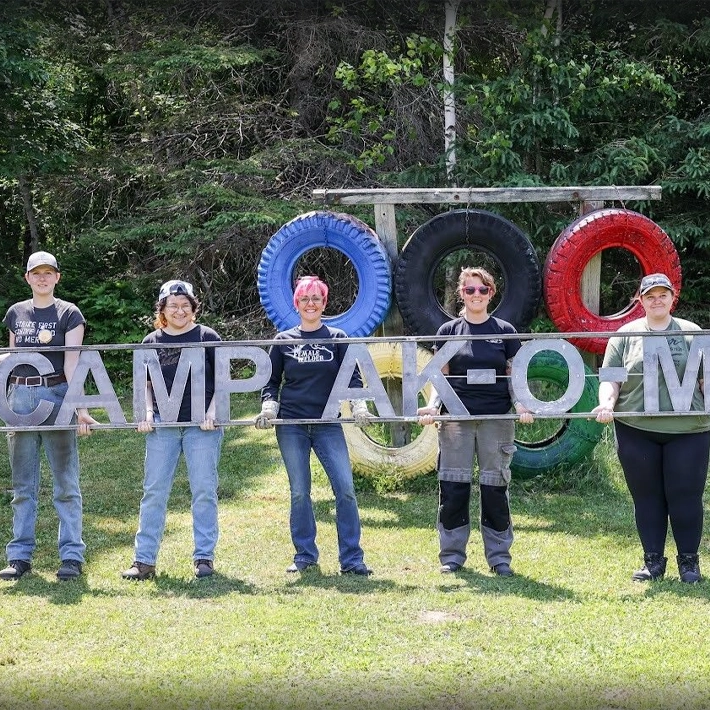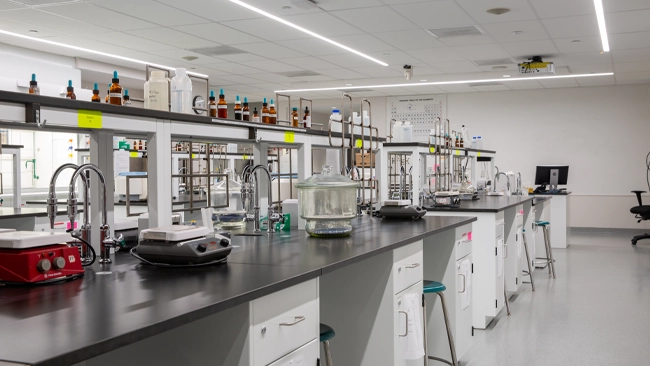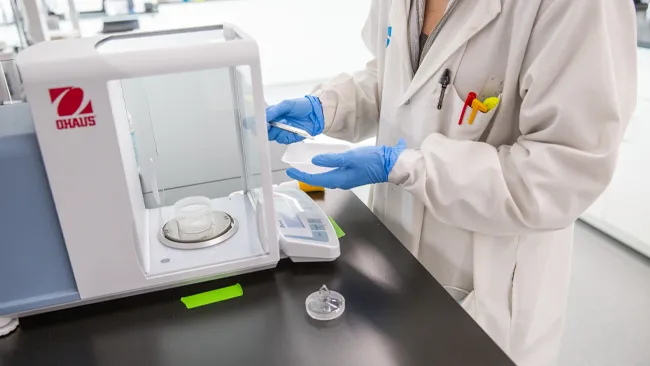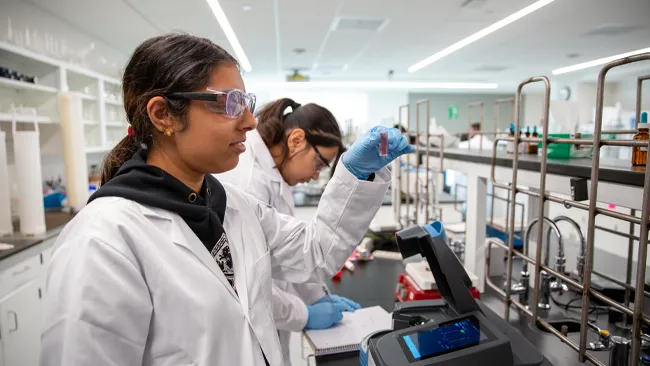
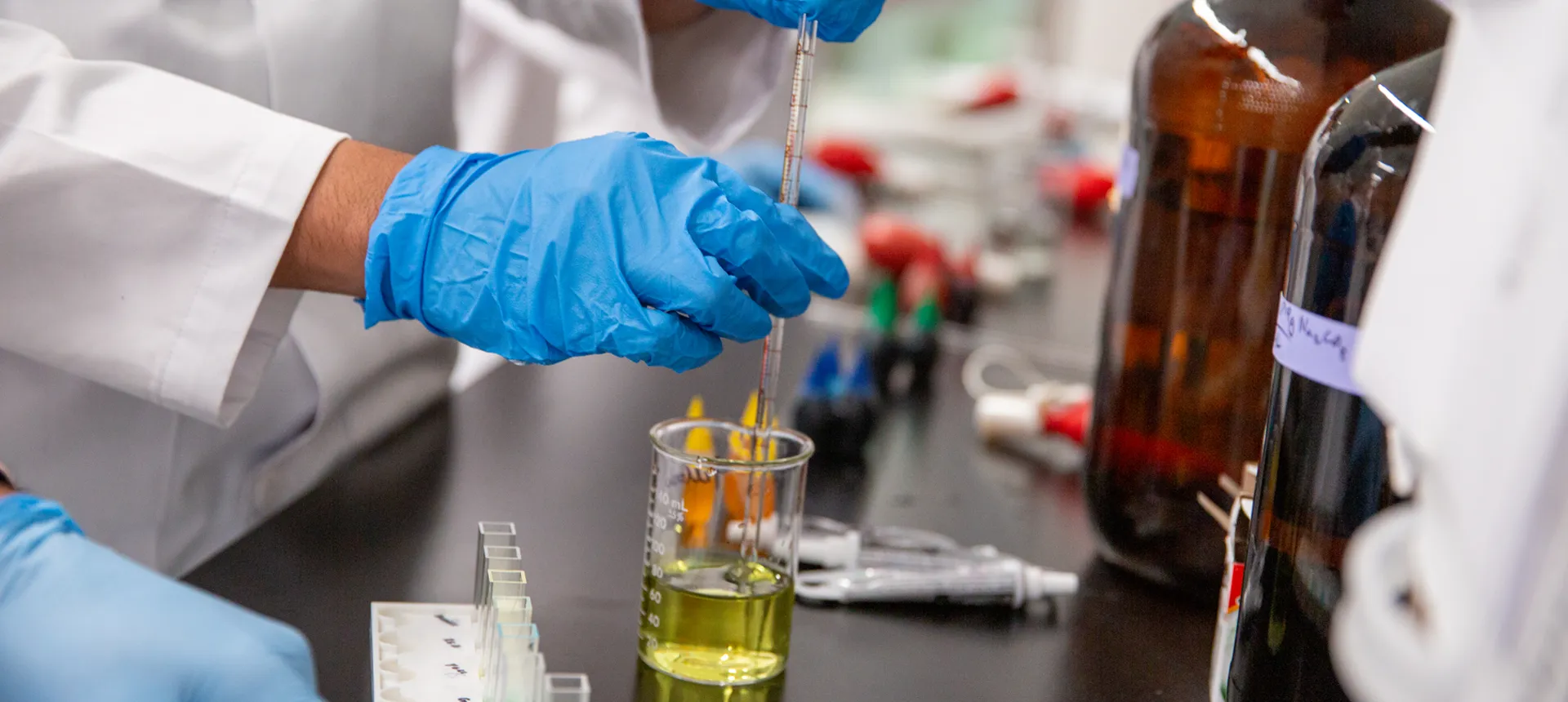
Chemical Lab Technology
Overview
Are you passionate about science and enjoy working with your hands? This may be the perfect career for you.
Chemical Lab Technologists are professionals who work in laboratories and are responsible for conducting experiments, analyzing chemical compounds, and carrying out research. They play a crucial role in various industries such as health care, agriculture, pharmaceuticals, and manufacturing, among others.
As a Chemical Lab Technologist, you will have the opportunity to work with cutting-edge technology and equipment. You will work closely with scientists, chemists, and other professionals to develop and improve products, processes, and procedures. Your work may involve designing and conducting experiments, analyzing data, preparing reports, and ensuring that the lab is well-maintained and fully operational.
Exciting aspects of this career field are the potential for innovation and discovery and the variety of roles available. Chemical Lab Technologists are involved in the development of new products, material , and technologies that can have a significant impact on society. Examples include, developing new medicines, improving agricultural practices, or designing more efficient manufacturing processes.
Discover a profession that is dynamic and rewarding with opportunities for growth and development, and you can start training at Lambton College.
The Unique Program Features
Listen to Chuck Ewart, program coordinator, walk you through the program and what makes it unique.
Admission Requirements
O.S.S.D. or equivalent with:
- Grade 12 English C or U
- Grade 12 Mathematics C or U
- Grade 11 or 12 Chemistry C or U
- Grade 11 or 12 Biology C or U (recommended)
- Grade 11 or 12 Physics C or U (recommended)
Grade 12 Mathematics Requirement
Grade 12 Mathematics for College Technology or any grade 12U mathematics is recommended; Grade 12 Foundations for College Mathematics (MAP4C) minimum final grade is 60%. If the program is highly competitive, students with Grade 12 Mathematics for College Technology or any Grade 12U mathematics will be given preference.
The admissions process is competitive and meeting the minimum academic requirements does not guarantee admission.
Lambton College reserves the right to alter information including admission requirements and to cancel a program or course at any time; to change the program curriculum as necessary to meet current competencies or changes in the job market; to change the pathways to third-party certification bodies; or to withdraw an offer of admission both prior to and after its acceptance by an applicant or student because of insufficient applications or registrations or over-acceptance of offers of admission. In the event Lambton College exercises such a right, Lambton College's sole liability will be the return of monies paid by the applicant or student to Lambton College.English Language Requirements
- IELTS of 6.5
- or -
- TOEFL iBT 79
- or -
- Passed Lambton Institute of English placement test
Meeting the minimum English requirements does not guarantee admission. Students with higher English proficiency scores will receive priority in the admission assessment process.
Meet Samantha
Samantha works in Lambton College's research department with research students from this program. Hear about the exciting things she works on in the lab.
Costs
- Term 1 $7,974.13
- Term 2 $7,188.03
- Term 3 $7,888.03
- Term 4 $7,188.03
- Term 5 $0.00
- Term 6 $7,888.03
- Term 7 $7,188.03
Total Cost of Program
Tuition fees are estimates and are subject to change each academic year. Fees do not include books (unless specifically noted), supplies or living costs.
Lambton College reserves the right to alter information including admission requirements and to cancel at any time a program or course; to change the location and/or term in which a program or course is offered; to change the program curriculum as necessary to meet current competencies or changes in the job market; to change the pathways third-party certification bodies; or to withdraw an offer of admission both prior to and after its acceptance by an applicant or student because of insufficient applications or registrations or over-acceptance of offers of admission. In the event Lambton College exercises such a right, Lambton College’s sole liability will be the return of monies paid by the applicant or student to Lambton College.
Additional Fees
-
Calculator (Sharp EL-W516XGB Advanced WriteView)$40.00
-
Lab Coat$20.00
-
Safety Glasses$10.00
-
Lab Notebook$10.00
Important Dates, Deadline & Late Fees
For additional information on registration dates, deadlines and late fees please refer to Registration Dates and Deadlines.
Student Fees
A student services fee is included in your tuition.
Health Insurance Coverage
Emergency medical insurance is mandatory for all international students at Lambton College. This includes students who are full-time and part-time and who are on a co-op. This insurance is provided by GuardMe - a third party insurance provider.
See Insurance Costs & DetailsTechnology Requirements
In order to keep pace with the requirements of each and every course in your program, Lambton College requires that each student have access to a laptop while studying at our college.
Labs & Equipment
Courses
General Chemistry I
This course provides an introduction to the fundamentals of chemistry through the integration of chemical theory and laboratory experiments. The theory portion includes the mole concept, gas laws, and electronic structure of atoms, the Periodic Table, chemical bonding and molecular structure. The laboratory portion is designed to apply the above theoretical concepts while developing basic skills of manipulation and careful observation through experiments in quantitative and qualitative analysis.
Mathematics for Technology I
This course reviews and develops concepts in algebra, trigonometry, complex numbers, and vectors with technical applications.
Analytical Techniques
This course serves as an introduction to the fundamental analytical techniques required for performance in chemical laboratory-related work. Students will learn techniques useful in later areas of the program, including proper use of the analytical balance, correct pipetting and volume-transfer techniques, and wet chemistry techniques. The course will also help students develop skills of good laboratory practices (GLP), proper recordkeeping and documentation, and chemical safety.
Critical Thinking & Writing
In this writing course, students respond to current issues and news articles via various styles of paragraphs and essays. Students practice thinking critically and organize and hone their writing to ensure clarity and correctness in their messages. Students explore different perspectives, and through synthesis, analysis, and response, strive for clarity of message and diplomatic expression of opinion based on fact. One of the pillars of Lambton College is a commitment to sustainability and equity, diversity, and inclusion, including Indigenization of the curriculum; where appropriate, readings in this course will reflect this commitment. Critical Thinking and Writing lays the foundation for a subsequent research-writing course.
Job Search & Success
This course provides student with skills and knowledge to help support their career search and succeed in the workplace. Students align their personal skill set and goals to guide them on their career paths. They will learn how to effectively conduct a job search, build a professional and well-tailored resume and cover letter, and develop and practice interview techniques. Students will also develop their personal brand to help support effective career networking and aid in their job search. Teamwork and collaboration in the workplace are also discussed. Self-reflection is used to inspire insight and support their professional career journey.
General Education Elective
General Chemistry I
This course will provide an introduction to organic chemistry and selected common functional groups in that field, some of which are important monomers in biological polymers and plastics. Students will also explore physicochemical properties of solutions, such as gas solubility, colligative properties, acidity and osmotic pressure. A large portion of the course investigates the chemistry of reaction processes, including chemical equilibria and the energy balance of chemical reactions as it relates to the flow of heat energy (calorimetry) and electric energy (electrochemistry). Fundamental processes involving nuclear chemistry and the chemistry and control of process water are introduced. Many of these concepts are supported and reinforced in the laboratory portion of the course.
Mathematics for Technology II
This course contains elements of algebra, and introduces the concept of functions including graphing. It also introduces differential and integral calculus with basic applications.
Analytical Techniques
The student will be introduced to Canadian laboratory techniques, including good laboratory practices for analytical labs (such as appropriate lab record keeping and documentation), laboratory chemical safety (WHMIS/SDS), and lab procedures. Students will learn techniques useful in later areas of the program, such as preparing solutions, proper chemical labelling and storage, and maintaining a laboratory notebook.
Communications for Technology
Technical writing differs from most student writing; therefore, it is necessary for students to learn the structure, nuances, and style of technical writing to be successful in completing labs, summaries, and reports. Through research writing and documentation, and through oral presentations, successful students will gain important transferrable skills that provide the basis for technical communication required in their other coursework and the workplace.
Biochemistry
This introductory course covers the structure and function of the biological macromolecules, the structure, metabolism and genetics of eukaryotes and prokaryotes, and an introduction to microbiology and biotechnology. Laboratory component provides the learners with hands-on experience in exercises which complement the lecture material. This course is designed to provide the detailed theory and refined skills needed for further study in microbiology and biotechnology.
Health & Safety for Industrial Processes
The graduate of this course will have a good understanding of safety aspects of the law, the legal responsibilities of the workplace, and his/her own legal rights and responsibilities, as well as work processes and procedures being used in present-day industry. This course will give them a basic understanding of the Occupational Health and Safety Act and its associated Regulations, and an understanding of health and safety issues in an industrial setting.
General Chemistry III
This course furthers the fundamental chemistry gained previously by continuing topics in organic, inorganic, and physical chemistry. Topics covered prepare students for more advanced concepts covered in later course areas. The laboratory portion is designed to augment theory with appropriate techniques and methodology.
Statistics for Technology
This course contains descriptive statistics, basic probability, and regression analysis. The course also includes binomial distribution, normal distribution, Student's t-distribution and F-distribution. The statistical ideas of sampling, confidence intervals, and hypothesis testing are introduced. This course also includes elements statistical process control, and system reliability.
Analytical - Physical & Spectometry Methods
The student will be introduced to good laboratory practices for analytical labs and appropriate lab record keeping. In each area listed next, both theory and practical understanding is developed. Physical methods of analysis will cover gravimetry, calorimetry and stress-stain evaluations. Electrochemcial methods of conductivity, and pH are covered and electromagnetic methods, focusing on infrared, Atomic Absorption, and Atomic Emission
Introduction to Industrial Chemical Processes
This course, specifically designed to support students involved in Process Technology and related technology programs, examines the development of industrial complexes, refining and petrochemical and petroleum products, plastics and rubbers (polymers), and the manufacture of ammonia, steel and aluminum. Basic principles of industrial chemistry process units and energy production, with particular focus on nuclear power, are reviewed and applied to typical processes drawn from a variety of industry sectors. This course also includes a brief overview of the general factors which lead to the development of a petrochemical complex, with particular emphasis on the history and subsequent development of the Sarnia-Lambton industrial complex.
General Education Elective
Biotechnology
This introductory course focuses on the theoretical background and practical application of the techniques employed in microbiology and biotechnology. Microbiological techniques include aseptic techniques, microscopy, and the use differential staining, growth media and metabolic tests. Biotechnological techniques include those utilized in cell culture, fermentation, and genetic engineering. An overview of the regulation, history and ethics of biotechnology will be explored. Laboratory exercises and lectures will provide the tools and basic knowledge to understand the application of techniques to the industrial, agricultural, environmental and medical fields of biotechnology.
Quality Assurance & Control
Quality in the chemical laboratory is about the data being produced being free of error and with well defined and understood limits, consistence and uncertainty. There are national and international standards for quantifying quality. This course will understand the importance of quality in the laboratory, be familiar with the standards that control and define quality, know how to sample to ensure quality through appropriate sampling, method selection, measurement practices and documentation.
Analytical - Separation & Imaging Methods
This course continues the exploration of analytical technology, beginning with the topics of sampling techniques. In this unit the students will learn about strategies for how and where samples are collected, and how they are stored and prepared. In the second unit chromatography in many of its variants is explored. The mechanisms of component separation are presented along with the hardware components of a typical system and how the generated data is analyzed. Some methods for improvement of separation are covered. In the third unit, methods of microscopy are covered, from the many optical methods to electron imaging and atomic force microscopy. In the final unit, a survey of new and potential methods are examined.
Environmental Management
Leading-edge process operations are successful when the end product is produced safely and in an environmentally sound way. Modern technologists in the process industry are called on to carry out a wide range of tasks including environmental source control. This course is designed to develop a basic understanding of industrial process impact on environment, strategies of environmental protection as well as to appreciate responsibilities of process operators towards environment. The course emphasizes the importance of ecosystem concepts, societal demands, communication and environmental laws as they apply to chemical production facilities.
General Education Elective
Co-op Work Term (Four Months - optional)
Co-operative education provides students with the opportunity to apply classroom learning to the workplace, undertake career sampling and gain valuable work experience that may assist students in leveraging employment after graduation.
Co-op (Four Months - optional)
Co-operative education provides students with the opportunity to apply classroom learning to the workplace, undertake career sampling and gain valuable work experience that may assist students in leveraging employment after graduation.
Natural Health Products
Growing interest in natural health products, led by cannabis legalization, is explored in this course. Scientific work in the area of active components for products like cannabis, ginseng and kombucha will be covered. Sample analysis for active components and sample preparations are the main focus.
Reinforced Plastics
Engineered materials systems with the combined benefits of plastics and reinforcement are explored with an emphasis on natural product reinforcement; things like hemp, rice hulls and crystalline cellulose. The recycling benefits and technology are covered in general and as they pertain to these naturally sourced reinforcement materials.
Energy Systems
The petrochemical industry from extraction to processing into energy and materials products is covered in this course. Polymer chemistry and production is explored. Polymers and energy products (for example; bio-diesel and bio-ethanol) from renewable resources is also covered.
Proposal Writing
A student will work with a mentor to develop a proposal for their applied research project occurring in the next term. Steps in the proposal writing process will be covered.
Design of Experiments
Applied Lab Skills I
In this course the leaning objectives are met through the lens of an applied research-based question. A student will work with a mentor to solve and explore an identified research problem through implementation of procedures and techniques explored in the preceding semesters of the program. Students will be involved in selecting the appropriate techniques, calibrating and maintaining equipment, and producing valid data for analysis.
Applied Lab Analysis I
In this course the leaning objectives are met through the lens of an applied research-based question. A student will work with a mentor to design and analyze experiments to solve and explore an identified applied research problem. Students will be responsible for evaluating the quality of the data, statistical analysis of the data, and considering if the data meets compliance of any relevant industry or government standards.
Scientific Communications & Dissemination I
A student will work with a mentor to plan, communicate and manage the solution to an applied research problem. The emphasis will be on proposal writing, project definition budget creation. Other reporting including health and safety reports, sustainability reports, press releases will be addressed.
Contact
Centre for Global Engagement
LAMBTON COLLEGE SARNIA
1457 London Road
Sarnia ON N7S 6K4
After Graduation
Employment Opportunities
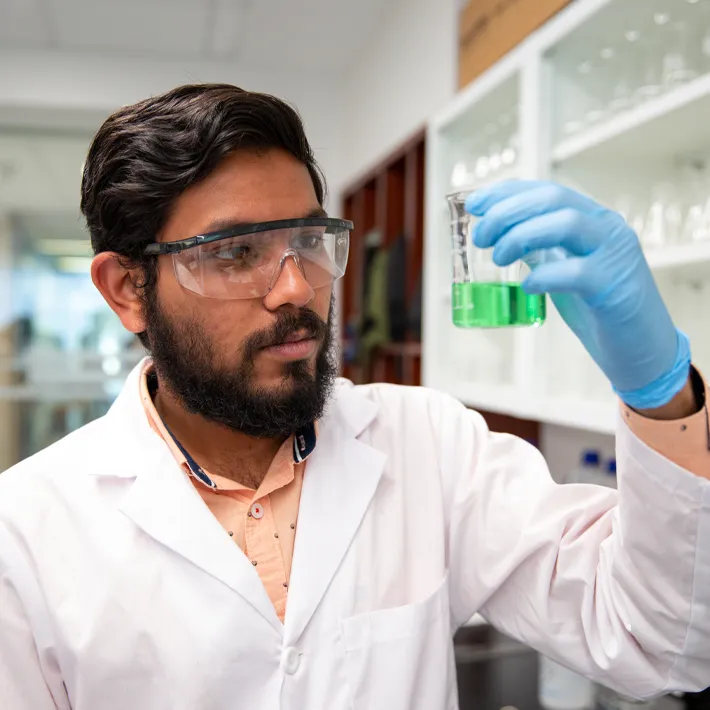
Graduates may find employment as chemical laboratory technologists in a range of settings including, research laboratories, government agencies, educational institutions and technical sales, and in industries such as pharmaceutical and bio-technology, cosmetics and consumer health products, petroleum, mining, water and wastewater, solid waste, environmental protection, energy and food science.
Career positions may include, but are not limited to: analytical technician, bio-chemistry technician, biological lab technician, chemical analyst or lab technician, formulation technician, pilot plant technician, quality control technician, validation and documentation technician, laboratory services following ISO 17025 standards.
Pathways
Transfer to Programs within Ontario
- Bachelor of Science Honours Chemistry - Applied Chemistry Stream (General Ontario Pathway)
- Bachelor of Technology - Manufacturing Engineering Technology
Want to see more Ontario transfers? Visit ONTransfer.ca.
Transfer to Programs outside of Ontario
- Bachelor of Science in Environmental Studies
- Bachelor of Science in Environmental Practice
- Bachelor of Arts in Environmental Practice
Looking for Support After Graduation?
The International Graduate Services & Support Centre (GSSC) is a place dedicated to assisting International alumni as they seek employment and settle into Canadian life following graduation.
Post-Graduate Employment
International students who successfully complete their programs of study at Lambton College may be eligible to apply for a Post-Graduation Work Permit (PGWP) Program. This program allows students to gain valuable Canadian work experience.
A work permit under the PGWP may be issued for the length of the study program, up to a maximum of three years. A post-graduation work permit cannot be valid for longer than the student's study program, and the study program must be a minimum of eight months in length. The length and approval of the PGWP is determined solely by Immigration, Refugees and Citizenship Canada (IRCC).
Students must meet the eligibility requirements to apply for a post-graduation work permit.
Immigration Regulations & Changes
Immigration regulations are legislated by the Federal Government of Canada and are subject to change at any time without notice. Students are responsible for ensuring that they are in compliance with all Immigration, Refugees and Citizenship Canada regulations at all times during their studies and while in Canada. Lambton College staff are not authorized to provide advice or guidance on immigration-related matters. Prospective applicants and current students should consult the Immigration, Refugees and Citizenship Canada website or call the IRCC Call Centre at 1-888-242-2100 to answer or clarify any immigration-related questions or information.
Co-op
About Co-op
Students in this program have the opportunity to gain valuable work experience by applying classroom learning during co-op experiences.
Learn more about co-op terms and the roles and responsibilities of students and co-op advisors.
More Information
Student Responsibilities
- Course and program delivery schedules are proposed and subject to change for each intake.
- Students are required to bring their own laptop with wireless capability.
- Students are advised to bring an official copy of their most recent police clearance, driver's license, and vaccination record from their home country.
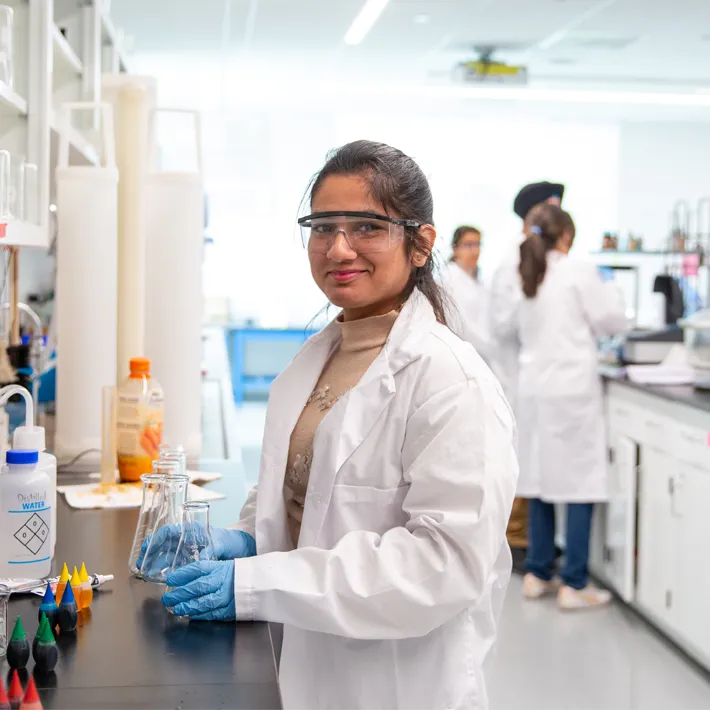
Technology Requirements
It is recommended that students purchase a laptop with a Windows operating system.
Internet Speed Requirements
For best performance for students learning remotely, an internet connection with a minimum of 40 Mbps download and 10 Mbps upload speed is recommended in order to effectively use video conferencing and remote lecture delivery software as well as, other online resources remotely. Due to the large area over which students may be dispersed, we are unable to recommend a specific provider, so you will need to inquire around your area to find one that best suits your needs.
Minimum Laptop Requirements
In order to access the internet and virtually-delivered software and courseware, student laptops should include the following at a minimum. By meeting the following specifications, students will be equipped to access software and courseware on their laptop through the internet:
- Intel i5 8th Gen Processor or equivalent
- 16 GB of RAM (with a minimum of 8 GB)
- 100 GB HDD or more
- HD Graphics
- Webcam with a microphone
- Wireless 802.11n/ac 5ghz capable
- Windows Operating System (Windows 11)
Please note that Chromebooks and MacBooks may not support all software required for your program; students should verify compatibility with their professors.
Software
To ensure students are getting the most our of their classroom experience, some software will be required.
Lambton College has made this software easily accessible online. Students can leverage our Microsoft Office 365 software packages and services. In addition, much of the software you require for your courses will be available on demand for use on any device - on or off campus.
Women in Technology & Trades
Discover how Lambton College's Women in Technology & Trades (WiTT) group is empowering women to excel in technology and trades.
Visit our WiTT page for more information on mentorship opportunities, events, and resources designed to support your journey in these dynamic fields.
Learn More